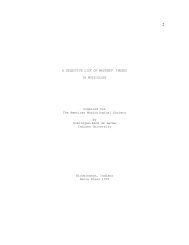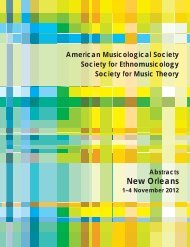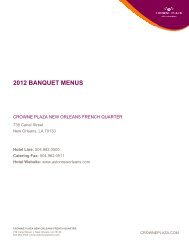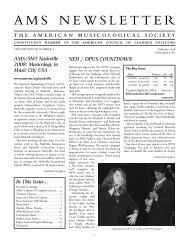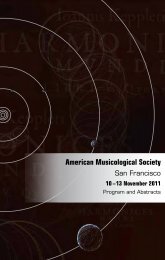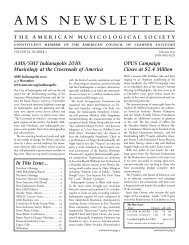AMS Philadelphia 2009 Abstracts - American Musicological Society
AMS Philadelphia 2009 Abstracts - American Musicological Society
AMS Philadelphia 2009 Abstracts - American Musicological Society
Create successful ePaper yourself
Turn your PDF publications into a flip-book with our unique Google optimized e-Paper software.
<strong>Abstracts</strong> saturday afternoon 155<br />
The paper then turns to the much earlier period of the 1880s when Dujardin actually developed<br />
stream of consciousness prose. Rather than viewing it in isolation against a Wagnerian<br />
foil as Dujardin himself did, I situate the technique within a broad range of his little-studied<br />
literary practices at that time and show similarities of syntax and diction between stream of<br />
consciousness prose and other genres that he produced. These include: literal translations<br />
of Wagner’s librettos; an important “paraphrase” of Amfortas’ monologue in the first act of<br />
Parsifal; and prose poems and free verse on Wagnerian subjects. They also include Dujardin’s<br />
song cycle to his own vers libres called Litanies, six mélopées pour chant et piano (1888), virtually<br />
unnoticed by critics then and now. The choice of “mélopée” is provocative: often applied<br />
with derision to Wagner’s post-Lohengrin works by hostile French critics, here it appears as an<br />
implicit marker of healthy experimentation. The local-level formlessness implied by the term<br />
is its very link to stream of consciousness writing.<br />
In sum, the paper will illustrate how the origin of stream of consciousness prose lies in the<br />
same pool of resources explored by Symbolist writers in Wagner’s wake. In broad narratives of<br />
music history, progressive French culture at the fin de siècle is often described as both an extension<br />
of Wagner’s art and reaction to it. One thinks, for example, of Debussy’s claim to write<br />
music après Wagner (and not d’après Wagner) or Mallarmé’s musings on Wagner’s limitations.<br />
Dujardin’s Litanies are as bold as any piece by Debussy or Satie in this period, his heterogeneous<br />
writings as cutting-edge as those of the leading Symbolists. Yet he voiced little anxiety<br />
about Wagner as an influence, favoring welcoming embrace over Oedipal response.<br />
“TRISTAN FüR ANFäNGER”: IRONIC SELF-<br />
PARODY IN die MeiSterSiNger<br />
Christopher Alan Williams<br />
Bowling Green State University<br />
To paraphrase Hans Sachs’s famous Flieder-Monolog, die Meistersinger is a work that is difficult<br />
to grasp yet impossible to forget. This elusive, “unermesslich” difficulty partly lies in the<br />
fact that listeners are distracted by its apparent harmonic and melodic clarity and episodic<br />
simplicity, especially compared to its endlessly-discussed predecessor, tristan und isolde. After<br />
all, how can the tunes, set-pieces, and unremitting C-major of Meistersinger’s last act betoken<br />
something as worthy of attention as the previous opera’s relentlessly difficult philosophical<br />
and chromatic probing? This goes double for scholarly commentators, who recently have<br />
fixated on its overtones of nationalism and undertones of anti-Semitism, to devastating effect.<br />
These aspects played an undeniable role in the work’s reception, especially during the<br />
Nazi and post-war eras (for opposite reasons), but they deflect attention from the work’s<br />
oft-vaunted “humanity” and its central theme: the role of modern art in bourgeois society.<br />
In Wagner: Beyond good and evil, John Deathridge even explains his avoidance of discussing<br />
Meistersinger, not just because of his personal distaste for “singing contests,” but because<br />
that eminent Wagnerian feels that the work’s “smug” complacency puts it on a lower level of<br />
achievement than his other works. Yet, given Meistersinger’s long gestation, Wagner’s obsession<br />
with spinning his operas into cohesive wholes, and his evident pride in the work, it seems<br />
unlikely that he had lessened his seriousness of purpose significantly after tristan, despite its<br />
sunny, comedic atmosphere.<br />
Ironically, the episode that causes Hans Sachs and the other masters the most consternation<br />
is among the least examined episodes in the entire opera: Walther’s trial song, “Fanget



